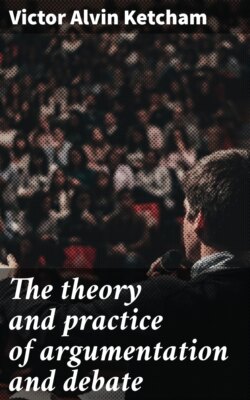Читать книгу The theory and practice of argumentation and debate - Victor Alvin Ketcham - Страница 9
На сайте Литреса книга снята с продажи.
III. Educational importance of argumentation.
ОглавлениеFrom the standpoint of mental discipline no study offers more practical training than does argumentation. It cultivates that command of feeling and concentration of thought which keeps the mind healthily active. The value of this kind of mental exercise cannot be overestimated. Especially is it valuable when the arguments are presented in the form of a debate, in which the speaker is assigned to defend a definite position and must reply to attacks made on that position. Such work brings forth the best powers of mind possessed by the student. It cultivates quickness of thought, and the ability to meet men on their own ground and conduct a successful encounter on the battlefield of ideas.
Another faculty of mind which debating develops is tact in the selection and presentation of material. Since the object of debate is action, it is not enough that the speaker show his position to be the correct one. He must do more than this; he must make the hearer desire to act in accordance with that position. Otherwise the speaker will be in the same position as the savage who induces his fellows to conform to his ideas by the use of a club,—the moment the influence of the club is removed the subject immediately reverts to his former habits of thought and action. If you convince a man that he is wrong by the mere force of argument, he may be unable to answer your argument but he will feel like a man who has been whipped in a physical encounter—though technically defeated he still holds to his former opinions. There is much truth in the old saying that, “He who is convinced against his will is of the same opinion still.” Therefore, the debater must do more than merely convince his hearer; he must persuade him. He must appeal to the reason, it is true, but he must also appeal to the emotions in such a way as to persuade his hearer to take some definite action in regard to the subject of dispute. Thus there are two things which the debater must attempt—conviction and persuasion. If he convinces his hearer without persuading him, no action is likely to follow. If he persuades his hearer by appealing to his emotions, the effect of his efforts will be short lived. Therefore, the debater must train himself to persuade his hearer to act in accordance with his wishes as well as to find reasons for such action and give them.
Finally, debating cultivates the ability to use clear and forcible language. Practice of this kind gives the student a wealth of expression and a command of language which is not otherwise possible. The obligation to reply directly to one’s opponents makes it necessary for the student to have such command of his material that he can make it apply directly to the arguments he has just heard.
The educational value of debating is greater than that of any other form of oral or written composition because it cultivates: (1) The command of feeling and concentration of thought which keep the mind healthily active, (2) The ability to state a clear-cut proposition, and to analyze it keenly by sifting the essential from the trivial, thus revealing the real point at issue, (3) The ability to find reasons and give them, (4) The power to state facts and conditions with that tact and diplomacy which success demands, (5) The power to persuade as well as convince, (6) The power of clear and forcible expression. Certainly any subject which tends to develop these qualities ought to receive the most careful attention of the student.
